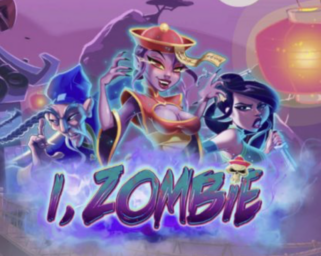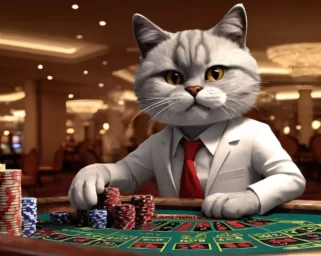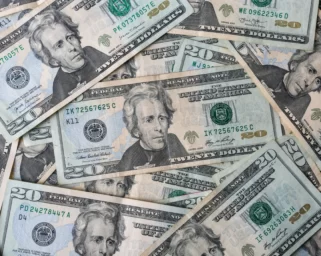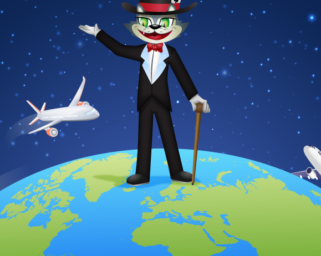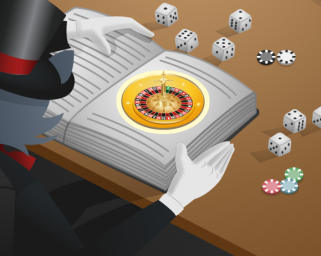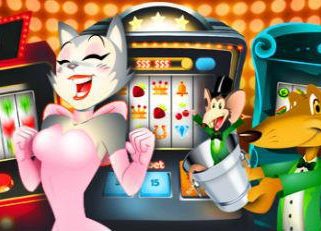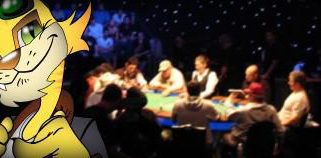Global gambling laws appear to be relaxing in favor of casinos. As a result, new casinos regularly pop up in empty field space and blocks of cyberspace. The cultural journey of gambling leads from Paleolithic caves to Mesopotamia, from ancient Chinese gambling houses to modern Macau megaresorts.
A gambler’s journey through the millennia involves early wagering on fighting animals. Bored Roman soldiers cast dice between battles. Masked Venetians gambled in underground rooms. Poker-playing gunslingers gambled in Old West saloons. And mobsters set up the first Las Vegas casinos in the desert.
A Gambling Animal
Gambling has always been with us. Long before the lush Casino Royale type of gambling den appeared, early humans squatted in the dust and bounced carved knucklebones against cave walls.
And we’ve been rolling the bones ever since. Taking risks to reap rewards is hardwired in human DNA. Without risk, humans never would have left the cave.

Over the centuries, whenever groups of people started organizing gambling activities in central spaces, governments and churches got involved. Church doctrine and dogma often portrayed gambling as a primitive impulse based solely on greed. Therefore, it was classified as a sin. And with the help of governments heavily influenced by religion, gambling bans followed.
But laws governing human behavior are always broken, especially with so much money involved. Anti-drug laws do not stop drugs; they increase profits for dealers. And during a particularly pious period known as Prohibition, alcohol was illegal in America. During this time, the government’s attempt to curtail the ‘evils’ of drinking and gambling had the opposite effect: speakeasies and gambling dens flourished in Atlantic City and beyond, and organized crime ruled the roost.
Atlantic City boss Enoch “Nucky” Johnson justified the culture of illegal gambling and drinking with his public statement:
“We have whisky, wine, women, song and slot machines. I won’t deny it and I won’t apologize for it. If the majority of the people didn’t want them they wouldn’t be profitable and they would not exist. The fact that they do exist proves to me that the people want them.”
Enoch “Nucky” Johnson
Early Gambling Cultures
Thousands of years BC in Mesopotamia, before the first dice were ever rolled, the knucklebones of herd animals were used as tools for divination. Fates were forecast and foretold by the rolling of the bones. The markings on each bone represented symbols of fate, and a priest or holy person interpreted the symbols.
Eventually, the first 6-sided dice appeared in around 3000 BC. Rather than paying a diviner to interpret random probability, groups of people decided to take matters into their own hands—and started betting on the outcome of a roll of dice. Divine knucklebones and gambling dice have been found around gravesites and religious locations in the Mediterranean region for millennia.

China has been using playing cards since the 9th century, but they were betting on animal fights for thousands of years before that. These enthusiastic gamblers later played lotto games, dominoes, and Pai Gow. Records also show traces of gambling in Japan dating back to the 14th century.
Gambling is woven into the fabric of human cultures throughout our history. From the Ancient Greeks and Romans to Elizabethan England and Napoleon’s France, history is full of tales of people seeking entertainment in games of chance. And once a culture identifies a common human desire, soon it becomes profitable, and gambling houses and casinos begin popping up, regardless of whether or not they are deemed legal.
The First Casinos

In the 1600s in Venice, games of chance began spontaneously springing up in the streets. Government attempts to ban gambling only forced the games underground into private gambling rooms for nobility. Rather than punishing its most noble gentry for gambling, the Great Council of Venice opened Il Ridotto (the hidden room) in 1638 during the annual Spring Carnival.
The sight of gamblers wearing 3-cornered hats and elaborate masks became commonplace, and the exotic Carnival costumes became the official dress code of the Ridotto. Even though the Venetian casino was open to the public, only the more well-healed citizens could afford the fancy attire required to gamble. So once again, gambling was relegated to nobles and the wealthy.
In 1863, the famous Monte Carlo Casino was built in Monaco, the independent microstate located along the French Riviera. Its royal family, the Grimaldis, built the casino to bolster their dwindling bank balance at the time. The lush, luxurious gambling den was modeled after the German Bad Homburg casino/resort/health spa. The Monte Carlo Casino inspired Ian Fleming’s first spy novel, Casino Royale.
Another casino resort built in a tiny enclave is the Casinò di Campione in Campione d’Italia. Located near a lake and surrounded by Switzerland, the casino was founded in 1917 as a nest for spies to gather information from foreign visitors during World War I. In 2007, the casino demolished the original premises to make way for a 590,000-square-foot casino resort, making it the largest in Europe.
The Old West Saloon
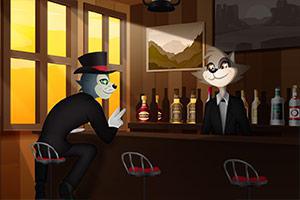
While the Europeans were building spa casinos and spy dens, American Old West saloons began springing up all throughout the frontier. These wooden shacks were part watering hole, part whorehouse, and part gambling hall for transient traders, miners, cowboys, and gunslingers. Along with the imagery of cowboys and Indians, shooting irons and tin stars, the saloon is forever cemented in the history of the Old West.
The legend of the Old West is etched in blood in the dusty wooden floorboards of frontier saloons from Dodge City to Deadwood.
Famous lawman Wyatt Earp ran saloons on the side; one of them was in Tombstone, Arizona, the site of the infamous shootout at the O.K. Corral. Another famous Old West figure, “Wild Bill” Hickok, was shot from behind in a saloon in Deadwood, Dakota Territory. He was playing poker at the time, and his famous ‘dead man’s hand’ of eights and aces added new jargon to the gambling vernacular.
Gambling was a normal part of everyday life on the frontier. But as Old West towns grew in size and new U.S. states were being formed around them, the law began cracking down on the lawless saloon. And gambling became an easy target.
Laws and Loopholes
U.S. laws governing gambling are complicated. They involve federal law, constitutional law, criminal law, regulatory law, and regional laws of states, districts, and counties. Gambling laws have historically been decided on a state level. Following the wild and wooly days of the western saloons, and the Big Easy ways of New Orleans gambling, governments began cracking down on casinos and gambling establishments.
By the late 19th century, gambling was mostly illegal in all 50 states, following a wave of public anti-gambling sentiment. Opponents of gambling claimed that it ruined lives and contributed to the destruction of communities through higher crime rates.
But you can’t put the genie back in the bottle. Anti-gambling laws only led to ‘creative’ ways around them. New Orleans was the capital of gambling in the U.S. until the state of Louisiana (along with all other states) made gambling illegal. But some clever New Orleans attorneys found loopholes in the laws, and casino owners moved all gambling activities onto river boats, bypassing city and state laws.
Gambling simply went underground. And in the process, organized crime grew from a just a few families to a major nationwide operation, by running speakeasies and illegal casinos. So the opponents of gambling were only half right; illegal casinos do more to create and spread crime, not legal ones.
Las Vegas and Atlantic City
After a failed mining industry and the massive construction costs of the Hoover Dam, Nevada went bankrupt during the Great Depression. The State of Nevada voted to legalize gambling as a way to stimulate the dying state economy. So in 1931, the first casinos started appearing in Las Vegas, Reno, and other Nevada towns.
After the decline of Atlantic City as a resort town, New Jersey legalized gambling in 1977, and the once-popular-beach-resort-turned-slum started to make a comeback. Following in the footsteps of the growth of Las Vegas, a new era of the megaresort casino began to take hold in Vegas and Atlantic City. This ushered in a new era of gambling tourism.
Gambling remained illegal in most states for the rest of the 20th century, with a few exceptions. Casinos can and do provide huge revenues for failing regions. Soon came the ultimate loophole: Indian reservations.
Tribal Gaming
Indian reservations are special territories located in U.S. states which are not governed by the laws of those states. The federally-granted territories have their own tribal governments which allow them to self-govern to a certain degree. Matters of infrastructure, education, and public health are overseen by the federal government. But most other decisions belong to each tribe.
There are over 500 federally-recognized Native American tribes in the U.S.. The large majority of them have the highest percentages of poverty in the U.S. Following the success stories of Las Vegas and Atlantic City, various tribes embraced the idea of creating casinos on their lands for increased revenue and economic opportunity. Since states do not own Indian lands, state gambling laws do not apply to them.
In 1979, the Seminole tribe opened the first reservation-based commercial gambling den. Soon after, tribes across the nation began opening their own casinos, but not without ruffling a lot of feathers. At first, trouble came in the form of local town law enforcement. Officers shut down early tribal casinos and arrested their owners.
Indian Gaming Regulatory Act
After many court cases, new gambling laws came into effect, including the Indian Gaming Regulatory Act of 1988. Certain classes of gaming fall under the sole jurisdiction of the tribe. Others receive oversight from the National Indian Gaming Commission, a federal group.
Court cases continue as additional tribes exercise their right to open casinos. Most of these cases involve communities which oppose gambling in their proximity. Sometimes towns with competing casinos look to crush the competition. But tribal casinos continue to pop up around the U.S. More than half of the states in the U.S. are home to tribal gaming. Of the 500 U.S. Indian tribes, less than half of them participate in tribal gaming.
The largest casino in the world (by gaming floor space) is a tribal casino. The WinStar World Casino in Oklahoma has over 600,000 square feet of gaming floor area.
Global Gambling Revival
With globalization and the internet, casinos spread all over the world, as well as cyberspace. Online casinos currently offer gambling to regions which allow it. Gambling laws change regularly, making it possible for a growing number of cities, states, and countries to open casinos.
When European colonies like Hong Kong and Macau rejoined China, they retained a large degree of autonomy as special administrative regions (SAR) of China. As such, these micro-states began creating their own laws regarding gambling.
Within 2 decades of its return to China, Macau underwent a major transformation. It is now home to the largest casino industry in the world, surpassing Las Vegas many times over. Other Asian territories like Singapore also see the economic advantage of gambling revenue.
With all of the economic benefits to local governments via gaming licenses, tax revenue, and employment opportunities, casinos benefit almost everyone involved.



